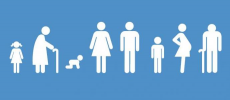
Naturally, the majority of social psychology research focuses on the variation of language across different cultures, since this is where the most obvious changes are visible, but it also differs across other variables, including age and gender, and as is clear with culture, one’s language may be distinctively related to how much one associates with a specific age or gender group. So, elderly people who speed most of their time with young people are likely not to display such a distinctive old-fashioned style of language.
Gender
Most of the gender research around language has been carried out in the western world, where there are strong stereotypes about gender differences in communication. In general research suggests that stereotypes about gender differences are far more exaggerated than in reality. Women, who are assumed to be more talkative, emotional and polite, seem to display far less variation from men on these characteristics than might be expected, and how much they are displayed seems more to do with context and situation than anything else.
Just as with ethnic groups, people of either gender appear to have a more stereotypical speech style for their gender dependant on how much they associate with their gender group. As well as this, audience dictates style, since when talking to the opposite gender style changes, with some linking this to traditional power differences between the genders. Research from the 80s suggests that women will use a more typically masculine and assertive style with male strangers, but a powerless and ‘feminine’ style with men they know well, though it is not known how this has changed in recent years. In mixed sex conversations women also tend to interrupt less, though this is once again related to power, and so varies between people and different contexts. In a conversation between a particularly high status woman and a low status man, the woman will probably interrupt more.
Age
While age is technically more of a gradual shift from young to old age, society has defined age groups which we use to talk about aging, and these are likely related to changes in behaviour as we get older. Society also defines stereotypical behaviour for each of these age groups, so that in western countries ageism can become a problem, where people are judged for their age alone. Accommodation theory, the focus of another psychology article, applies here, since based on stereotypes of older generations, many will slow down their voice and use shorter words when talking to older people to accommodate for language problems that they might have, however this can be a problem as many find this degrading and patronising.
Alternatively, it is unusual for older generations to accommodate for speech differences with younger people, such as modern slang, and some younger people find this frustrating, meaning that conversation between age groups tends to further reinforce the negative stereotypes. Some believe that age itself will not dictate language behaviour, but it is instead the social groups that we apply to age, such as teenage, middle-age and elderly, that causes the distinct differences in language style.
Perhaps if we were more accepting of people not fitting to the norms of articular social groups, we would see far few patterns across behaviour in general, since many of the patterns in our psychology are thought to be caused by conformity more than anything else, and the costs of not conforming to these norms can be disastrous.
Image from: http://ec.europa.eu/echo/sites/echo-site/files/styles/full-width/public/GA%20marker%20image.jpg?itok=1bAFEiA7

0 Comment:
Be the first one to comment on this article.